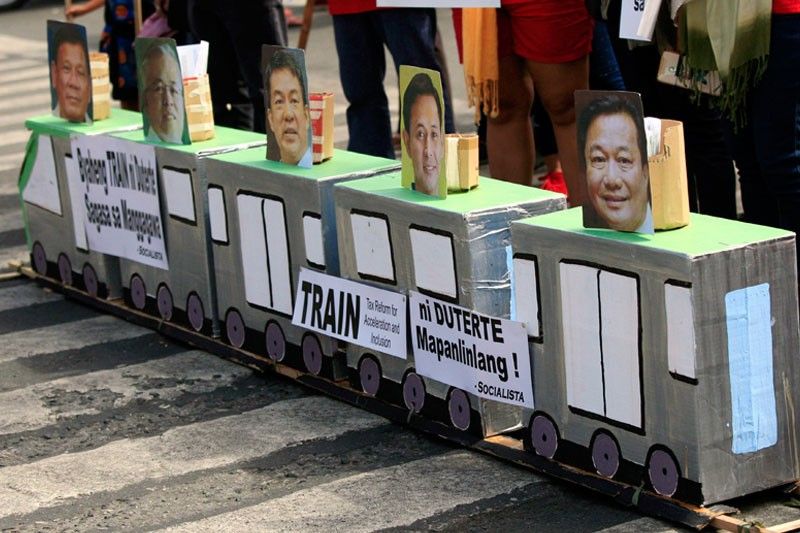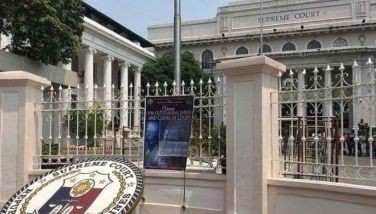Government urged: Protect workers from profiteers

Militant labor groups stage a protest against the TRAIN law in Mendiola, Manila yesterday. Edd Gumban
MANILA, Philippines — As prices of essential commodities continue to rise ahead of the full implementation of the Tax Reform for Acceleration and Inclusion (TRAIN) law, workers are asking the government to set in place safety measures to protect them from profiteers.
“Government must step in to impose consumer protection laws and regulations but we don’t see them, we don’t feel government is protecting us from profiteers and profiteering,’’ said Alan Tanjusay, spokesman for the Associated Labor Union (ALU).
“We are greatly concerned over government’s inadequate response to provide social safety nets to millions of poor Filipinos who are about to fall into deeper poverty due to inflation brought about by the implementation of TRAIN’s excise tax on fuel and sweetened beverages,” Tanjusay said.
He noted that businessmen are already increasing prices of goods drawn from their old stock. He said the Department of Trade and Industry’s talking tough against profiteers was nothing but lip service.
In pushing for TRAIN, Tanjusay said the administration of President Duterte appeared to have overlooked the law’s impact on lowly paid workers.
He said TRAIN’s implementing rules are not yet ready and the government institution tasked to implement social safety net program for the poor is unprepared.
“Millions of Filipinos will fall further into deeper poverty if government safety nets are not ready and its institutions ill-prepared to protect those affected by rising inflation caused by TRAIN excise tax,” Tanjusay pointed out.
Yesterday, members of militant group Bagong Alyansang Makabayan (Bayan) held simultaneous rallies nationwide to express their opposition against the TRAIN.
The rallyists also went to different markets to check how far the current minimum wage of P512 in Metro Manila could go.
“Duterte’s tax reform is a good law only for the rich and powerful, like the members of Congress and the President’s cronies. But for the majority of Filipinos, it is an added burden that could worsen hunger, poverty and precarious living in the country,” Bayan Metro Manila chair Mong Palatino said.
Palatino said yesterday’s nationwide protest actions marked the start of the series of rallies against the TRAIN in the coming days.
Food security threat
A militant farmers’ group also warned that TRAIN would be a threat to food security as rising production costs would force farmers to raise prices of farm produce, particularly rice.
“The overall rice production and consumption will be affected by TRAIN. TRAIN will cause worsening hunger among the poorest of the poor. Whatever minimal gain that low to middle employees will get from TRAIN will be easily offset and swept away by rising prices of commodities, services and public utilities,” said Danilo Ramos, chairman of the Kilusang Magbubukid ng Pilipinas (KMP).
He pointed out that the new excise tax on oil products would result in a minimum 20-percent additional cost in the use of fuel-run farm equipment.
“Farmers will have to shell out more money from their pockets for the added cost on production brought about by TRAIN. 2017 prices of diesel average at P33 per liter. Now, diesel prices have gone up to at least P40 per liter. Costs of fuel prices are higher in the provinces,” he said.
“According to government data, the country has four million hectares of rice harvested lands. This minimum sample computation would translate to a P1.176-billion additional cost for land preparation alone,” Ramos pointed out.
Prices of other farm inputs such as seedlings, fertilizer, pesticides are also expected to increase.
“This situation will have a domino effect on rice prices. Rice marketers and retailers are also expected to pass on the added cost to consumers, resulting in hike in rice prices,” Ramos said.
For the Unyon ng Manggagawa sa Agricultura (UMA), the TRAIN “will surely lead to further impoverishment of sugar field and mill workers.”
“In the first place, the more than 780,000 field and 25,000 mill workers in the sugar industry are already exempted from paying income tax and would not benefit from TRAIN. This is especially true for the former, who only earn an average of P50,000 annually or around P4,000 per month,” UMA said in a statement.
It said TRAIN “will lower the consumption of sugar, which will further decrease sugar workers’ already low wages. This may even lead to dismissal from their jobs, especially in the next cropping season starting October this year.”
UMA said “TRAIN is just one of the many neoliberal policies followed by Duterte and previous governments that favor the interests of big foreign businesses over those of the Filipino working people.”
“TRAIN was recommended by the Partnership for Growth (PFG) of the US with the Joint Foreign Chambers of Commerce (JFCC) to the US-Duterte regime,” UMA said.
UMA recalled that last year, even hacienderos planting sugarcane experienced losses due to the entry of high fructose corn syrup (HFCS) into the country. “These were used primarily by soft drink giants Coke and Pepsi, causing the price of sugarcane to go down,” it pointed out.
“From January to July 2017, the Philippines also imported 132 million liters of bioethanol from the US, an increase of 25 percent during the same period in 2016. Majority of the latter up to now is still imported from the US even if it can be produced locally from sugar and molasses, “ UMA noted.
Anakpawis party-list Rep. Ariel Casilao said fuel prices resulting from TRAIN “will clearly trigger shocking impact on prices of other commodities that will end up affecting the poor sectors.”
Casilao cited studies indicating that TRAIN would “worsen the tax burden on the 60 percent of the poorest with 2.3 percent or P47 billion of their gross income of P2.1 trillion, while the 40 percent richest with gross income of P4.1 trillion will only be burdened with 0.8 percent at P48 billion.”
Cash doleout
Meanwhile, the Department of Social Welfare and Development (DSWD) is all set to implement a cash dole-out program involving the grant of P200 monthly subsidy to some 10 million poorest families in 2018, and up to P300 a month in 2019 and 2020.
Emmanuel Leyco, DSWD officer-in-charge, said that the Unconditional Cash Transfer program is a component of the TRAIN. The UCT is allocated a P24-billion budget in 2018.
“The DSWD was given the responsibility by Congress to implement the distribution of the P200 per month UCT, and we will carry out that responsibility the most efficient way that we can,” Leyco said at a press briefing.
“We have put together a mechanism that will enable us to distribute the P200 UCT to 10 million Filipinos who belong to the poorer sectors of the country,” he said.
“Even as we implement our other social welfare programs, we will take on this task of setting up a new program management office (PMO) which will focus on the payroll generation, beneficiary validation and the release of the funds to the beneficiaries,” he added. – With Rhodina Villanueva, Ding Cervantes, Rainier Allan Ronda
Related video:
- Latest
- Trending




























